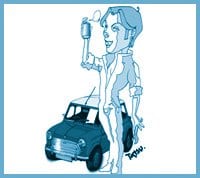I turn on the TV and there’s Jonathan Wilson wearing a pair of ridiculous tights and moaning that he’s having a latte-911 emergency. Then I realize it’s an ad for Jane’s Chicken. I just have to laugh. (Not only because Wilson’s funny, but because the product name makes me think of my drag character, Jane, bouncing some sweet sexy boy on her knee.)
But the smile quickly fades as the commercial ends and I have time to think. What I have just seen is a homophobic advertisement featuring a stereotypical effeminate choreographer, played by a gay man. What in heaven’s name could have gotten into Wilson – beside a frenetic urge to dance?
I don’t want to blame the guy too much. Or maybe I do. On the one hand, I used to be a starving actor and I know it’s a tough business. I was asked to audition for everything from fat old drag queens to… well, that was about it since basically, that’s what they wanted me to play, a fat old drag queen.
But I drew the line at effeminate hairdressers. Or more accurately, I once auditioned to play one and didn’t get the part. I say that so you won’t accuse me of being bitter (again).
Listen, I admit Jonathan Wilson is a brilliant actor (much better than I ever was) and he deserves any part he gets, and better. But why, oh why, Jonathan, did you have to take this one?
Jane’s Chicken is not the only offender out there on TV screens lately. A new entry for Salon Selectives hair care products features – you’ll never guess – an outrageously effeminate hairdresser. New hair care formulas have put him out of a job and he’s now employed as an effeminate mechanic.
I can already predict your reaction to my outrage. “Sky, just get a sense of humour, will you?”
Let me emphatically assure you I have a sense of humour. Sure, both of these ads are funny, for two reasons.
First, because we live in a homophobic culture, the release of tension that comes when we watch socially inappropriate behaviour makes us laugh.
Second, the performers in both commercials have great comic timing and are just, well, funny.
But that doesn’t keep me from feeling, after my laugh, that what I need is a good bath. What makes these commercials offensive is the same thing that makes me avoid movies where women are treated as bumbling sex objects, or black men are treated as stupid goofs. Homophobia, sexism and racism are not over. Performers like Chris Rock and those big-boobed gals in teen movies, for instance, pander to misogynist and racist notions without the self-consciousness that, say, Madonna and Sammy Davis Jr had so many years before them.
It’s the difference between laughing at and laughing with. When Madonna and Sammy played stereotypes, they were winking at us and saying “I know exactly what I’m doing, I’m actually quite a smart person, and I’m in control of this situation.”
The butt of a joke in a 60-second TV commercial has no such opportunity to gain our sympathy. And though viewers in their cozy little queer apartments in downtown Toronto might laugh at these commercials with generous sympathy, the same might not be said of your parents in Mississauga or of devoted Mike Harris fans in North Bay.
Sympathy is the key. And context. Does the stereotypical character have a well-rounded, leading role? When I wrote my plays Drag Queens On Trial and Drag Queens In Outer Space, the outrageous, effeminate gals were the leading characters, and theatre audiences sympathized with them.
It makes all the difference in the world that Jack, queeny guy on Will And Grace, is not the lead. He’s the freaky sideshow who doesn’t have a life and never will. If the handsome, sexy, straight acting Will can barely get a date, do you think the girly wimp has a hope in hell of not ending up lonely and alcoholic? It’s the fate we imagine for all effeminate men.
In a perfect world humour would never make us feel unclean. But the world’s not quite perfect yet. In fact we are being born back ceaselessly into the past, into a neo-conservative, Disney-dominated era, where old values like family and religion are supposed to be near to everyone’s heart once more.
So be prepared to see lots of unsympathetic, bumbling, female sex objects, stupid, goofy black men and silly, effeminate fags on your TVs and cinema screens. It’s good for the lie that we’ve matured beyond issues of race, gender and sexuality, that we ourselves are not prejudiced or evil, and the only bad man Is Osama Bin Laden.
So I don’t blame you, Jonathan, for doing that commercial. After all, everybody’s doing it, so you might as well join the crowd.
I’m just kinda sorry you did.

 Why you can trust Xtra
Why you can trust Xtra


